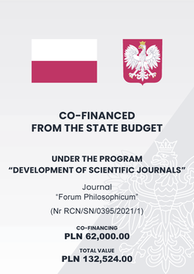- Home »
- Issues »
- 22/2 - Fall 2017 »
- Articles »
Who is the Other?
The Levinas–Ricœur Debate
Editor’s Note
Dr. Robert Grzywacz from Jesuit University Ignatianum in Kraków contributed to the wording and contents of some short passages of this article.
Abstract
This paper deals with the problem of what otherness consists in, and what its foundation is, within the I–Other relation. In this way, the study also explores the limits of ethics and of a quasi-religious attitude, in order to establish what is required to shape interpersonal relations in a non-violent way, when faced with the radical otherness of another human being. Such an investigation also intersects with a broader ethical discussion that aims to take account of glorious or heroic acts, focused on the issue of supererogation. The aim of the present study is to demonstrate the degree to which a neglect of reciprocity and justice in the context of such philosophical research constitutes a risky step. To this end, the main aspects of the debate between Emmanuel Levinas and Paul Ricœur are introduced. After examining the position of Levinas, and how Ricœur interprets the I–Other relation in Levinas, an attempt is made to assess whether the latter’s line of criticism is pertinent and helpful for attempts to arrive at the core of the disagreement between the two thinkers.
Keywords
Cite this article
Drwięga, Marek. “Who is the Other? The Levinas–Ricœur Debate.” Forum Philosophicum 22, no. 2 (2017): 175–90. doi:10.5840/forphil201722213.
Bibliography
Baron, Marcia. “Supererogation.” In Encyclopedia of Ethics, edited by Lawrence C. Becker and Charlotte B. Becker, vol. 3, P–W, 1674–75. London; New York: Routledge, 1992. Di Martino, Carmine. “For a Genealogy of Selfhood: Starting from Paul Ricœur.” In Hermeneutics and Phenomenology in Paul Ricœur: Between Text and Phenomenon, edited by Scott Davidson and Marc-Antoine Vallée, 61–74. Contributions to Hermeneutics 2. Basel: Springer, 2016. doi:10.1007/978-3-319-33426-4_5. “Entretien avec Paul Ricœur. Paul Ricœur et l’acheminement vers le soi. [Conduit par Philippe Michaël de Saint-Cheron].” Bulletin du Centre protestant d’études 43, no. 7 (1991). Accessed 23 September 2018. Digitalized at http://www.fondsricoeur.fr/uploads/medias/articles_pr/entretien-paul-ricoeur.pdf. Hill, Thomas E., Jr. Human Welfare and Moral Worth: Kantian Perspectives. Oxford; New York: Oxford University Press, 2002. doi:10.1093/0199252637.001.0001. Kierkegaard, Søren. Fear and Trembling. In Fear and Trembling and The Sickness unto Death, translated by Walter Lowrie, 29–221. Princeton: Princeton University Press, 2013. Levinas, Emmanuel. “De l’utilité des insomnies. Entretien avec Betrand Révillon.” Chapter 14 in Les imprévus de l’histoire. Paris: Fata Morgana, 2007. Levinas, Emmanuel. Otherwise than Being, or Beyond Essence. Translated by Alphonso Lingis. Dordrecht: Kluwer, 1991. doi:10.1007/978-94-015-7906-3. Levinas, Emmanuel. “Pour une philosophie de la sainteté, entretiens avec Michaël de Saint-Cheron.” In Michaël de Saint-Cheron, Entretiens avec Emmanuel Levinas 1992–1994, 21–52. Paris: Librairie générale française, 2006. Levinas, Emmanuel. Totality and Infinity: An Essay on Exteriority. Translated by Alphonso Lingis. Pittsburgh, PA: Duquesne University Press, 1969. doi:10.1007/978-94-009-9342-6. Levinas, Emmanuel. “Transcendance et hauteur.” In Liberté et commandement, 59–123. Paris: Fata Morgana, 1994. Poirié, François. Emmanuel Levinas. coll. Qui êtes-vous? Lyon: La Manufacture, 1987. Ricœur, Paul. Amour et justice. Points Essais 609. Paris: Seuil, 2008. Ricœur, Paul. Autrement. Lecture d’Autrement qu’être ou au-delà de l’essence d’Emmanuel Levinas. Paris: Presses universitaires de France, 1997. Ricœur, Paul. “Emmanuel Levinas, penseur du témoignage.” In Lectures 3. Aux frontières de la philosophie, 81–103. Points Essais 541. Paris: Seuil, 2006. First published in Paris by Seuil in 1994. Ricœur, Paul. Oneself as Another. Translated by Kathleen Blamey. Chicago; London: University of Chicago Press, 1992. Ricœur, Paul. The Course of Recognition. Translated by David Pellauer. Cambridge, MA; London: Harvard University Press, 2005. Simmons, J. Aaron, and David Wood, eds. Kierkegaard and Levinas: Ethics, Politics, and Religion. Bloomington, IN: Indiana University Press, 2008. Surber, Jere Paul. “Kant, Levinas, and the Thought of the ‘Other.’ ” In Emmanuel Levinas: Critical Assessments of Leading Philosophers, edited by Claire Katz and Lara Trout, vol. 2, Levinas and the History of Philosophy, 296–324. London; New York: Routledge, 2005. Originally published in Philosophy Today 38, no. 3 (1994): 294–316. doi:10.5840/philtoday199438317. Waldenfels, Bernhard. “L’autre et l’étranger.” In Paul Ricœur. L’herméneutique à l’école de la phénoménologie. Edited by Jean Greisch, 326–44. Paris: Beauchesne, 1995. Wall, John. Moral Creativity: Paul Ricœur and the Poetics of Possibility. New York: Oxford University Press, 2005. Wallace, Mark I. “The Irony of Selfhood in Paul Ricœur’s Hermeneutic Philosophy.” In Between Suspicion and Sympathy: Paul Ricœur’s Unstable Equilibrium, edited by Andrzej Wierciński, 161–71. Toronto: The Hermeneutic Press, 2003. Wallace, Mark I. “The Summoned Self. Ethics and Hermeneutics in Paul Ricœur in Dialogue with Emmanuel Levinas.” In Paul Ricœur and Contemporary Moral Thought, edited by John Wall, William Schweiker, and W. David Hall, 80–93. London; New York: Routledge, 2002. Westphal, Merold. “Commanded Love and Divine Transcendence in Levinas and Kierkegaard.” In The Face of the Other and the Trace of God: Essays on the Philosophy of Emmanuel Levinas, 200–23. Edited by Jeffrey Bloechl. New York: Fordham University Press, 2000. doi:10.2307/j.ctt1xhr5td.15.





